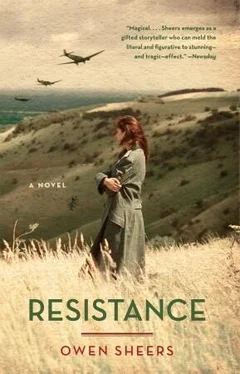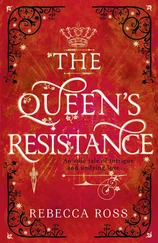Owen Sheers - Resistance
Здесь есть возможность читать онлайн «Owen Sheers - Resistance» весь текст электронной книги совершенно бесплатно (целиком полную версию без сокращений). В некоторых случаях можно слушать аудио, скачать через торрент в формате fb2 и присутствует краткое содержание. Год выпуска: 2009, Издательство: Anchor, Жанр: Современная проза, на английском языке. Описание произведения, (предисловие) а так же отзывы посетителей доступны на портале библиотеки ЛибКат.
- Название:Resistance
- Автор:
- Издательство:Anchor
- Жанр:
- Год:2009
- ISBN:нет данных
- Рейтинг книги:3 / 5. Голосов: 1
-
Избранное:Добавить в избранное
- Отзывы:
-
Ваша оценка:
- 60
- 1
- 2
- 3
- 4
- 5
Resistance: краткое содержание, описание и аннотация
Предлагаем к чтению аннотацию, описание, краткое содержание или предисловие (зависит от того, что написал сам автор книги «Resistance»). Если вы не нашли необходимую информацию о книге — напишите в комментариях, мы постараемся отыскать её.
Resistance — читать онлайн бесплатно полную книгу (весь текст) целиком
Ниже представлен текст книги, разбитый по страницам. Система сохранения места последней прочитанной страницы, позволяет с удобством читать онлайн бесплатно книгу «Resistance», без необходимости каждый раз заново искать на чём Вы остановились. Поставьте закладку, и сможете в любой момент перейти на страницу, на которой закончили чтение.
Интервал:
Закладка:
“And what if the Germans get this far?”
Mary’s question hung in the air. Maggie shot her a look as if to say, not now, not yet. Menna whispered, “Oh God,” into her handkerchief.
“Well, I’ve got to think of Bethan,” Mary continued, and for the first time her eyes weakened and filled, like groundwater rising through waterlogged moss.
Maggie rose from her chair and went over to the dresser where she picked out a leaflet from between two framed photos of her boys. It was dull green with “Stand Fast” printed across the cover. All of them had seen it before, propped on shelves and on sideboards in their own houses. It was the leaflet the Home Guard officer handed out the previous week. Returning to the table Maggie took her reading glasses out of her apron pocket and sitting down beside Menna again, read from the leaflet:
German troops moving across the country would not stop to attack a single house.… The public must stay indoors as long as there is fighting around them.… A slit trench in the garden may be dug for added protection. Diagrams to assist with the construction and buttressing of such trenches can be obtained from your local Women’s Institute.…
(a snort of derision from Mary)
The civilian must not attempt independent acts of armed resistance, but must also do nothing which would be of the slightest help to the enemy.… On the contrary, the enemy should be hindered and frustrated whenever possible.… If a civilian’s help is asked for by friendly military, as it may well be, it is his duty to answer wholeheartedly any call, however exacting, that may be made upon him.… Hide your maps. Hide your food. See that the enemy gets no petrol.
The leaflet ended with a simple statement in capital letters:
THINK BEFORE YOU ACT. BUT ALWAYS THINK OF YOUR COUNTRY BEFORE YOU THINK OF YOURSELF.
The four women sat in silence when Maggie finished. The single bird ticking outside the window was replaced by the rise and fall of a song thrush, repeating its melody again and again. The twigs of an overgrown bush brushed against the glass. And it was then Sarah fell. She was looking at a framed piece of needlework hung beside Maggie’s dresser. It had been made by Maggie’s mother when she was a girl. A simple house and garden in bright primary colours; animals around the house, a woman feeding the animals, and Maggie’s mother’s name neatly picked out in red thread above the picture, “Catrin Roderick—1862.” Everything Maggie had just read to them seemed to threaten that needlework picture. It was like the bomber again. The war had finally come to them. Even here in the valley, where events just over the hill could go unknown, unnoticed for months. And Tom had left. They’d all left. Now, just when the German guns were firing on English soil, when the German army was marching towards them.
Sarah had never known Tom to keep anything from her before, and as she sat there she began to work through all he must have done to keep this secret. That was why Mary was angry. She understood that now. The men had abandoned them, now of all times. And they’d planned it, behind their backs. Together and without them.
“Why have they gone? Why now, Maggie? And where? You said it’s t’do with the invasion. How?”
All three of the other women looked up at Sarah in surprise. Maggie let out a heavy sigh. She recognised the falling.
“Well?” Sarah asked again, looking at the other women, her voice urgent, “Where d’you think they’ve gone? Hereford? Brecon?”
Menna began crying again and Mary’s face was drawn with worry. Sarah stood up and paced to the window. Looking out onto Maggie’s yard, she half expected to see a German troop carrier coming up the lane.
“What do you know, Maggie?” she asked, her back to the room.
“Nothing, bach,” Maggie replied. “Only … I suppose … well, that it must be to protect us.”
Sarah turned from the window. “Protect us? What d’you mean? They’ve gone. Tom, William, Jack, Hywel, The Court boys. They’ve all bloody gone.”
Mary raised her eyebrows at Sarah’s cursing.
“Well, maybe that’s it, isn’t it?” Maggie said, fixing Sarah with her eye. “Maybe we’re safer with them gone. For now.”
Menna lifted her head from her hands and turned to look at Maggie. But she said nothing more, just looked up at the dark beams, her own eyes pricking with tears, as if she’d said too much already.
“What d’you mean?” Mary said, her voice hard-edged again.
“Well,” Maggie said, speaking slowly. “It’s usually the men they want, isn’t it? In the other places they’ve been. The men they’re worried will cause them trouble. With the men gone, there’s nothing here to worry them, is there? Just us.” She broke off, removing her glasses. She looked at the faces of the three women looking back at her, all of them frowning. A thin smile lifted and fell across her lips. “But we’re not going to see any Germans here anyway, are we? I mean, what would they want here? The tractor? Some eggs? We’ve hardly got anything ourselves, and for once that’s a good thing, because it means we haven’t got anything for them either. They’re not going to bother coming all the way up here. Not in winter they won’t. No,” she continued, looking round at all of them, warming to her theme, “the only thing we should worry about is carrying on ’til they get back. And we can do that. We’ll need to help each other, of course. Like we always do, just a bit more, that’s all. Bethan can help with your two, Menna. Can’t she, Mary?”
Mary looked uncertain but gave a curt nod. “Yes, I suppose she can.”
“What about Edith?” Sarah said from the window.
“Well,” Maggie said. “Nothin’s changed for her has it? We’ll just carry on as usual with Edith, just like we always have.”
Edith Evans lived up at The Gaer, the highest house in the valley. A low-lying stone cottage with a broken-backed roof that took its name from the Iron Age hill fort that once occupied the ridge above it. Like most of the houses in the valley, The Gaer had been whitewashed, and when Sarah first moved to Upper Blaen she remembered seeing it on bright mornings, shining above the Black Hill’s shadow line thrown across the steep wall of the ridge. Its position meant that over the years she’d come to use it as a crude barometer. If she came out into the yard and The Gaer was obscured by low cloud, she knew the day was set in rain. If she could see its whitewash, bright against the hill’s tawny canvas, she knew the sun would be strong all morning.
The hill fort itself was now no more than a series of faint concentric rings buried beneath centuries of soil and grass. It was as subtle a feature on the ridge as the banks and dips of Tom’s body had been in the horsehair mattress of Sarah’s bed. Like Tom’s outline, the missing physical presence of the fort, its ramparts and defences, could be traced only by someone who knew the place intimately, who could still see what was no longer there in the earth echoes underfoot. A careful eye, sensitive to the landscape, could make out where a gate once stood or the foundations of huts where men had once slept and fought and loved and cooked. To the casual observer, however, there was nothing there, just a toothless gap in a long grassy jawbone of earth and a few faint humps beneath a tangled mass of bracken and gorse.
Edith had lived at The Gaer alone with her son ever since her husband was killed in an accident in Longtown. A motorbike skidding on black ice, him unsteady on market-day legs, his arms full with a box of groceries, still talking to the shopkeeper over his shoulder. This was before Sarah moved into the valley, but Maggie had told her how at one time there’d been a hope that after an appropriate period Edith might marry Reg at The Court. There’d even been an awkward attempt at courting, Reg stooping through the low doorway of The Gaer, a bunch of wildflowers in one hand, a leg of lamb in the other, the residue of carbolic soap cracking in the creases around his neck. But neither was made for romance. Both had only ever known their dead spouses, and their capacity for companionship had been formed and died with them. Reg might have lived at The Court, but he was of the same stock as the other men in the valley: spare of speech, tender as a wet nurse with a newborn lamb, clumsy as a schoolboy with a woman. And Edith wasn’t interested anyway. She was too busy for love or anything like it. As well as keeping The Gaer going, she had her son, Roderick, to raise. Edith had high hopes for Roderick. Tending sheep about a wind-whipped cottage on the prow of a ridge wasn’t for him. No, she wanted university for her boy, an education. Every Monday morning she’d see him off on the ten-mile walk down to Pandy, where he’d catch the train to the grammar school in Hereford. He’d won a scholarship as a weekly boarder, one of only two in the district. During the week he lodged in the town with a spinster and her brother, whose house Edith had checked over thoroughly first, running her damp finger over every lintel and door jamb. Her son would be a doctor, an engineer, a lawyer even. His health must be protected. Roderick became the focus of Edith’s life, as if her husband’s death, having amputated one channel of her love, left the one still flowing to her son doubled in force to the point of breaking its banks. Which is exactly what happened when Roderick went to war and was killed in a training accident before he’d ever fired a shot in anger.
Читать дальшеИнтервал:
Закладка:
Похожие книги на «Resistance»
Представляем Вашему вниманию похожие книги на «Resistance» списком для выбора. Мы отобрали схожую по названию и смыслу литературу в надежде предоставить читателям больше вариантов отыскать новые, интересные, ещё непрочитанные произведения.
Обсуждение, отзывы о книге «Resistance» и просто собственные мнения читателей. Оставьте ваши комментарии, напишите, что Вы думаете о произведении, его смысле или главных героях. Укажите что конкретно понравилось, а что нет, и почему Вы так считаете.












